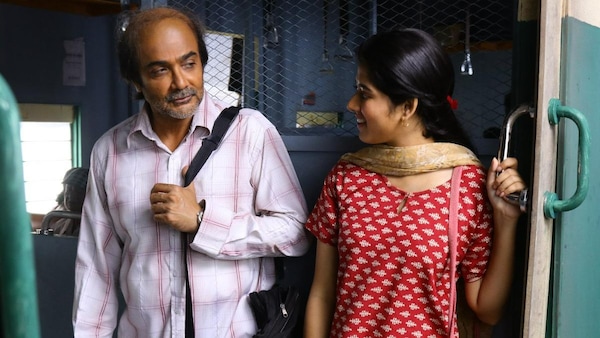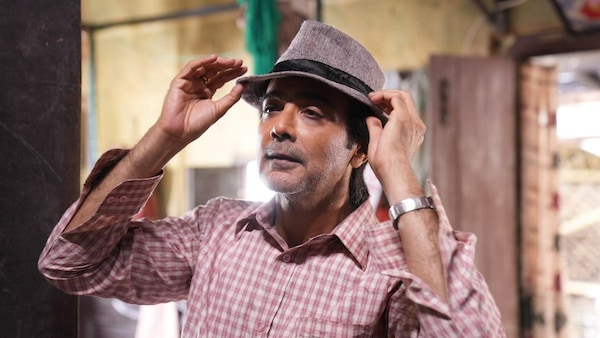Aay Khuku Aay review: Prosenjit and Ditipriya’s father-daughter saga zips off to a great start but then it fizzles
Directed by Sauvik Kundu (Switzerland-fame) and produced by Jeet’s production house, the film begins with a beautiful story of a humble family but in the midway it seems as if the director loses his way and ends up with an unconvincing revenge drama.

Last Updated: 04.54 PM, Jun 18, 2022
Story: Nirmal Mondol (Prosenjit Chatterjee) is film star Prosenjit Chatterjee’s doppleganger. He has performed stage shows dancing to Prosenjit’s hit songs while mimicking his style and has earned plaudits. Sometimes his act at local village shows has come as a prelude to the actual superstar’s appearance on stage. However, now he is bald and cruelly taunted as ‘Teko (bald) Prosen’ by the local mischief makers. He vends books at local trains to make ends meet. Buri (Ditipriya Roy), his daughter, runs their household since her mother (Rafiath Rashid Mithila) passed away at some unspecified point in her early childhood. She wants to learn to dance but her father opposes the idea vehemently. While she prepares and sells homemade pickles and bori (dried lentil dumplings – a popular food accompaniment in Bengal), she practises dance secretly. Eventually, Buri meets Sanjay (Rahul Dev Bose), who takes her to a village self-help group so that she can earn and independently help her father. He encourages her to dance, gives her a spare mobile phone so that she can learn steps from YouTube and helps her to earn more. Despite Nirmal and Buri’s poverty, things seem alright until the lockdown changes everything. Like a bolt from the blue, Sanjay unconvincingly turns into a rogue.
Review: The title, Aay Khuku Aay, is inspired from a famous song by Hemanta Kumar Mukhopadhyay and Sravanti Mazumder that delves into the beautiful relationship between a father and daughter. The film begins as a story of an underachiever Nirmal Mondol and his daughter, Buri. Through their everyday’s humble life, the film offers a very convincing picture of Bengal’s rural landscape, and the people’s life and struggle. Nirmal’s struggle to make his daughter happy and Buri’s relentless effort to ease her father’s pain blend distinguishably well in a backdrop of a serene rural setup that is still untouched by the hustle and bustle of Kolkata. In fact, their interactions with Nirmal’s best friend Gossain – a blind beggar (Sankar Debnath) – reflect an honest narration of simplicity.
After an engaging first half, the film descends into crass sentimentality that weakens the tautness of the story. With the introduction of the crisis, the plot and the characters start losing credibility. It could have been a story of a father-daughter relationship or a story of a failed artiste. It could also have been a revenge drama with multiple subplots. However, by the second half, the director somehow mixes up multiple plots together and, as a result, the film loses its coherence. After a while, we are left with a half-baked narration of heartbreaks, revenge and political corruption.

The film scores high in the acting department. Ditipriya plays her role shining like a bright star. She is effortless in her portrayal of Buri. She has aspirations but she is also practical. It’s not a mean task to portray a small-town teenager in a poverty-stricken set up. Ditipriya delivers a powerful performance to make Buri a convincing character.
It is also a brave move for Prosenjit to take on such an uncharismatic character like Nirmal Mondol. Nirmal is a loser and cannot dream big. For a superstar like Prosenjit, it was certainly a challenge to accept the role and he does justice to the character. It is also a comforting sign to see that an actor of his caliber actually explores unconventional and challenging roles even today. Here, we also must mention the stupendous effort that makeup artiste Somnath Kundu has put to make Nirmal Mondal look like Prosenjit. The actor looks as authentic as possible.
Meanwhile, Sankar Debnath fails to cast his usual charm with his loud dialogue and lousy wig. Similarly, Sohini Sengupta also has been forced to put up an overwrought acting performance. Rahul Dev Bose, meanwhile, does his job fittingly, though his character is bound to confuse the audience. After a number of TV serials, this is one of his initial works on the big screen and he proves to be very apt for the role.
Verdict: Aay Khuku Aay could have been a good film, but it fails to live up to its title's promise of a simple and fond father-daughter tale. However, one should watch it because of Ditipriya’s outstanding performance and Prosenjit’s stupendous effort to explore new characters beyond his usual heroic stereotypes.
Subscribe to our newsletter for top content, delivered fast.

